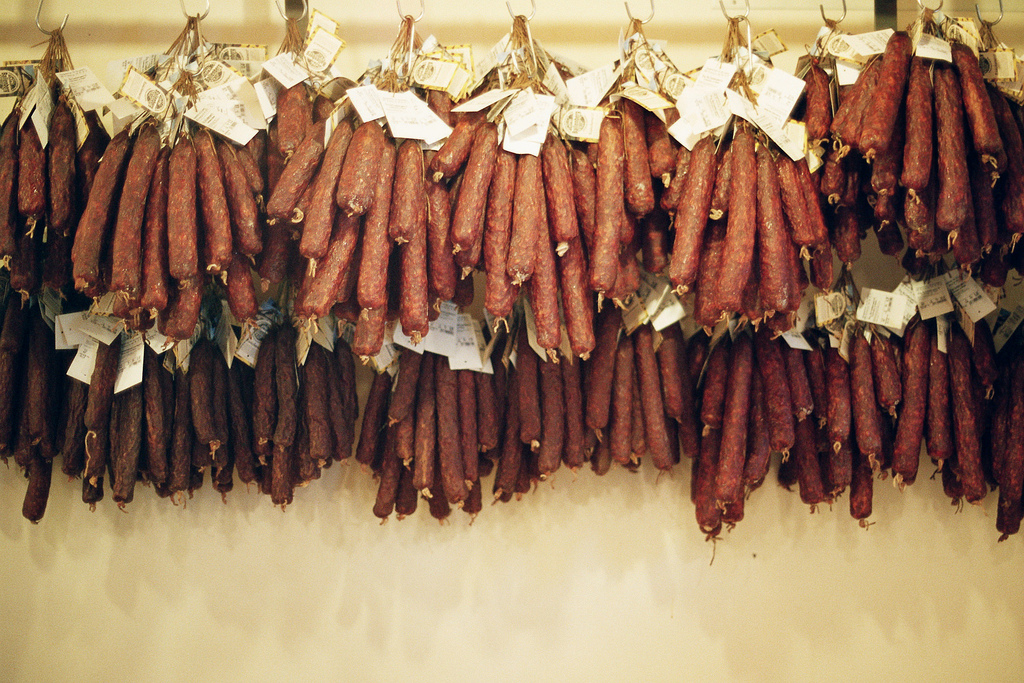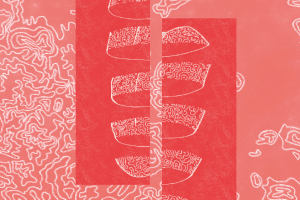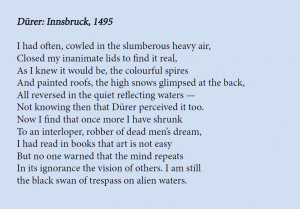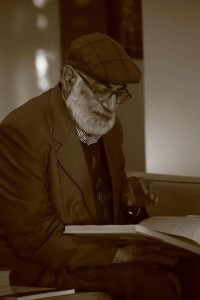
‘THE TALE OF HAMKIN’ OR ‘THE LITTLE SAUSAGE BOY’
by Joshua James | May 11, 2015
Anon. – Translation from the Middle Dutch by Joshua James
I am now going to recount to you the very unfortunate tale of Hamkin, who was a young boy made all of sausages and meat products. I have heard the tale told many times before by tellers various in skill and apprehension, some telling it truthfully and others peppering it with foreign elements and reforming it to their fancy. Regardless, I have heard none which comes so close to the true history as this telling, which I heard from an old woman who dwelled in the country of Almain in Hamkin’s own town (whose name I cannot at present recall). But I will not delay any longer in assuring you of the truth, as the tale will speak its own rightness to those who are open to it. So the story begins:
There once was a butcher who was very old and very lonely. This Old Butcher lived by himself, with no wife or children to love and look after him, and so he spent his days in melancholy, sadly hacking up animal carcasses and weeping into raw pork chops.
One day, after he had had to throw away yet another batch of pork pie mix because it had become too wet and sloppy with weeping, the shop door was pushed open and a cloaked stranger shambled in. The Old Butcher could not see his face, but the stranger spoke out in a voice which was dry and crackly, and said, “Old Butcher, I know why you are crying. It is because you have nobody and you are lonely. I want to help you.” And the stranger drew from his ragged cloak a small wooden box and pressed it into the Old Butcher’s hands.
“Take this box and place a sausage in it, and leave it at the foot of your bed for three weeks, and then you will have a child and you will be a happy Old Butcher.” Then the stranger left. The Old Butcher, doubtful, but willing to try anything, put a sausage in the box as the old stranger had instructed, and left it at the end of his bed. After three weeks had passed, muffled cries started to sound from inside the little chest and it began shaking. The Old Butcher quickly undid the clasp and opened it, and inside there was a little boy, crying and shaking.
The little boy was made entirely of raw meat. His legs were made of chops and his feet were steaks and his body was made of two hams and each of his arms was made of many packets of sausages and he was all slippery with meat juice and lard. His head was made of sausages as well, and his ears were rashers of bacon and his face was sliced ham and his little nose was a sausage all by itself. He looked just like a little boy made of meat, except for that he didn’t have any eyes. Instead, he just had two dark, pink little pits where his eyes should have been. The Old Butcher took the child down to the shop and took a pair of sheep eyes and squeezed them into the boy’s meaty sockets, so that he would be able to see. “I will call him Hamkin,” said the Old Butcher to himself.
So, little Hamkin and the Old Butcher passed a happy year together, and they loved each other dearly. The Old Butcher taught Hamkin to speak and to read and to write, and instructed him in numbers, and showed him all the different kinds of meat in the shop. Hamkin loved being in the shop with all the meat, and sometimes when he was very well-behaved the Old Butcher would let him drink up extra meat juice or perhaps give him a bone or a chop to suck on.
Hamkin grew and grew, and soon began to help the Old Butcher in his shop. One day the Old Butcher went to the market and left his son in charge of the shop. Hamkin trying to get all the chores done quickly so as to impress his father when he returned. He was trying to carry a large dish of ox tongue and a plate of jowl bacon all at the same time, but his slimy feet slipped and he fell over, scattering meat across the floor. He didn’t want to be told off by his Papa, so he gathered the dirty meat up and threw it away, and when the Old Butcher asked Hamkin what had happened he said, “Nothing, Papa”. And when he told this lie, his little sausage nose grew another link, so that he had a sausage dangling from his nose, which slapped against his face when he walked. The Old Butcher was shocked, but he was not really cross with Hamkin, because he loved him so. I will not dwell on this any further, as there are more important things to tell of, but you should know that this was how Hamkin discovered the dangers of lying, and after this day, Hamkin did not tell a lie for a very long time.
Days passed and months passed, and although Hamkin was happy enough, he was always sad that he wasn’t a real boy. “Papa”, said Hamkin, “will I ever be a real boy and not made of processed beast-flesh?” And the Old Butcher, remembering the stranger’s words, replied, “When you have shown yourself to be good and worthy, Hamkin. Then you will be a real boy.” “When will that be, Papa?” “Soon enough, dear one, but you must be good as good and you must never tell lies. Do you promise me that you will always be good and will never tell lies?” “Of course, Papa, anything you say,” said little Hamkin, his extra nose-link slapping wistfully against his top lip as he spoke.
Hamkin wanted more than anything to be a real boy, made of human skin instead of pig bits, and he wanted desperately to go to school as he felt that this would be the only place for him to learn how to be a real boy. He would ask his Papa sometimes if he could go along to lessons, and for a long time the Old Butcher always told him he was too young. One day, however, the Old Butcher came to Hamkin and said, “My boy, it is time for you to go to school,” and he gave his son a satchel and an apple for the teacher and a little white shirt and a school cap to wear. Hamkin squealed with joy, his extra nose-link swinging around and thwacking him wetly in the face, but Hamkin did not care one bit. He put the shirt on straight away, and ran out into the street, quick as quick, eager to get to school.
On the way to school, Hamkin saw a group of boys with satchels and white shirts like his own, laughing and playing as they dawdled along, and so he decided to go and make friends with them. The boys were scared at first, but soon enough they were teasing Hamkin and shouting at him and tweaking his little sausage nose and throwing sharp rocks that bruised and punctured his soft meat body.
The boys continued to bully and bruise Hamkin every day he went to school, but Hamkin kept going because he wanted so much to learn how to be a real boy like the others. He was proud of his shirt and his cap and he wore them everywhere he went, feeling very grand as a young scholar, going about his studies. Soon, though, the boys began not just to tease poor Hamkin, but also to steal bits from the meaty edifice of his body to take home for their mothers to cook for tea. A chop from his shoulder, a pork pie from his knee – Hamkin would go home and the Old Butcher would have to fix him up with fresh meat pieces from his own supply. The word spread about the Little Meat Boy, and soon all the townsfolk began to accost Hamkin on his way to and from school. Person after person would chat to Hamkin in a friendly manner for a few moments and then let him go on his way. Hamkin was delighted with his popularity, and contentedly thought that he must have been becoming a real boy, but little did he know that his new acquaintances were using him as a free meat-stand, and sneaking odds-and-ends from his body. They never took so much meat that he would notice, and they always made sure to take loose bits so that he wouldn’t feel it.
This went on for months. By and by, the townsfolk stopped buying meat from the Old Butcher, as they knew they could just purloin some meat from his son as he walked to his lessons, and all the time the Old Butcher was having to patch up the gaps and crevices left by the thieving townsfolk. Soon enough, Hamkin and his Papa sank into poverty. After some months had passed, the Old Butcher was so desperate and so hungry that he resolved to harvest some sausages from his son’s face, as he knew that they would be plentiful if his son were to lie, and then he would be able to provide for them both. And so, the Old Butcher coerced little Hamkin into telling lie after lie after lie after lie after lie, until there were hundreds of fat sausages in a heap at his feet. Then the Old Butcher took his great cleaver and with one swift chop he sliced off Hamkin’s nose.
All along the street and all through the land Hamkin’s squeals and shrieks were heard, so loud were they. No one man could describe the tenth part of how loud and how piercing were his cries. It was the worst pain he had ever felt. The Old Butcher saw his son’s pain, but was desperate and told Hamkin to lie some more, but Hamkin was in such pain that he refused to speak at all. The Old Butcher was angry at this, and beat Hamkin savagely with his tenderiser, and the little sausage boy had no choice but to flee, snatching up a packet of sausages and a lamb chop from the counter to gnaw at as he went.
Hamkin ran and ran, clutching his lamb chop and sausages, until he came to the woods a way beyond the edge of the town, the furthest he had ever been from home. The gloaming was creeping into perfectly innocent corners now and filling them with terrible things, and Hamkin was beginning to feel that he would much rather have been at home with his Papa than out alone at night. The dark forest was no place for a little sausage boy. Just as the first lardy tear was rolling thickly down his cheek, he heard a crackly old voice say to him, “Good evening, little one. Are you lost?” Hamkin turned and saw a strange old beggar in a cloak sitting only a few feet away. “I’m not lost, but I’m scared of the dark”, said Hamkin, disconsolately wringing his chop. “You’ve nothing to be afraid of, but perhaps you should go home soon. I say,” said the stranger, “that’s an awfully nice looking chop.” “Yes,” said Hamkin, giving it a lick, before noticing just how thin and pale the stranger looked. “Would you like to have it?” said Hamkin, holding out his chunk of meat (and hoping dearly in his mind that the stranger wouldn’t accept it). “What a kind boy!” said the stranger, taking the chop, “I wish I could do something in return for such a good and honest boy. Is there anything I can do?” Hamkin turned his face to the ground, and with a sad smile told him that all he had ever wanted was to be a real boy. “But I don’t understand,” said the stranger, “you look like a real enough boy to my eyes.”
Hamkin was puzzled, but touched his face and found it was smooth and dry and not made of sliced ham, but of real skin. He moved his hands down and realised he had real arms and not sausage-bundles. He looked down to see that his knees were no longer knobbly pork pies, but had become knobbly boy knees. He touched his nose, and it was a nose, and not a sausage. Hamkin squealed and wept with glee, and danced a little jig on the spot. So happy was he that he no longer felt upset with his Papa; he just wanted to tell him the good news. Hamkin said goodbye to the stranger and ran as fast as he could back towards the dark town.
Well, Hamkin was running very, very fast, and the night was very, very dark. He was running so very fast that he dropped his sausages as he went, and his little school cap flew from his head, but he was so happy that he didn’t care. Now, whether he saw the well and wasn’t able to slow down in time, or whether he never knew it was there until he was at the bottom of it, nobody is quite sure as far as I have been able to discover. I will not certainly fabricate details to make up for absent truths.
Hamkin never returned home that night, and the Old Butcher was very worried at his absence, and very sad that he had tried to harvest sausages from his son. He searched all through the town that night, knocking on door after door after door. Each person who interrupted their supper to speak to the butcher said they would keep a look-out, but nobody had seen the little sausage boy.
Soon it was morning, and by and by the Old Butcher came upon the sad heap of sausages and his son’s school cap, at the edge of the town, and realised that he must be looking upon what was left of his poor son. The Old Butcher was distraught, and bundled up the heap of sausages, and hugged them in his arms as he wept all the way home, his tears mingling with the juice from the sausages. He wanted to bury little Hamkin properly, and so, sobbing, he dug a deep hole in his garden. He went and found that little box, which had been Hamkin’s cradle, and gently settled the sausages down inside. He closed the lid then, and lowered the box into that narrow tomb, shovelled the wet earth over it and walked gravely back to his empty house. He never could bear to look at the little grave, though he felt so very guilty that sometimes he was certain he could hear his meaty son’s little voice crying out to him mournfully. He never knew that Hamkin had realized his dream of becoming a real boy and, though he passed by it many times before he himself died as a very elderly man, the Old Butcher never knew what lay at the bottom of that deep, dark well.
So the story ends, and I was told nothing else. This is the truth of the whole tale which folk tell as that of Hamkin The Little Sausage Boy, as far as I have been told it, and be assured that I have added nothing of my own manufacture. You may go to Hamkin’s town and see Hamkin’s Well (as the folk of the town still call it), which is where the sausage boy died, and see that there still stands a butcher’s shop where the Old Butcher lived, although he is of course long gone. If anything has been missed, it is because nobody knows the full story, and I have not filled in the gaps with my own false creations – this is all I have to say on the matter.




